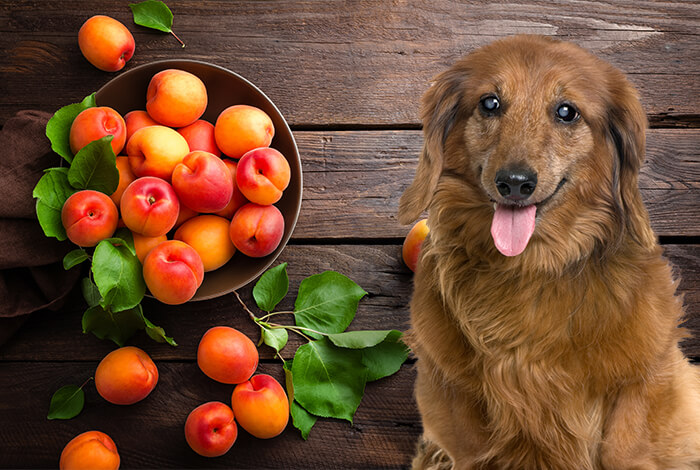Can Dogs Eat Apricots? Health Considerations for Your Dog-2024

Can Dogs Eat Apricots? Yes, dogs can enjoy the flesh of apricots safely in moderation. This tasty fruit isn’t toxic for your pup when prepared properly, making it a nice treat for them.
Just remember to always avoid the pit, leaves, and stem, as these parts can be harmful to dogs. With the right precautions, apricots can be a fun and healthy addition to your dog’s snack time!
So, let’s briefly discuss that-can dogs eat Apricots?
Nutritional Benefits of Apricots for Dogs
If you’re wondering, can dogs eat apricots, you’ll be pleased to know that apricots can actually offer some nutritional benefits when prepared and served correctly. This sweet fruit is not only tasty but also packed with essential nutrients that can support your dog’s overall health. Let’s explore the specific nutritional benefits of apricots for dogs.
Rich in Vitamins A and C
- Vitamin A: Apricots are a fantastic source of vitamin A, which is vital for maintaining good vision and eye health. It helps prevent vision problems and supports your dog’s overall well-being.
- Vitamin C: This vitamin acts as an antioxidant and is essential for a strong immune system. It helps your dog’s body fight off infections and illnesses, ensuring they stay healthy and vibrant.
High in Dietary Fiber
- Digestive Health: Apricots are high in dietary fiber, which plays a crucial role in promoting healthy digestion. Fiber helps regulate your dog’s bowel movements and can prevent constipation.
- Gut Health: A diet rich in fiber supports a healthy gut microbiome, which is essential for nutrient absorption and overall digestive health.
Contains Antioxidants
- Reducing Inflammation: Apricots contain antioxidants that help combat oxidative stress and reduce inflammation in your dog’s body. This can be particularly beneficial for older dogs or those with inflammatory conditions.
- Cellular Protection: Antioxidants protect cells from damage caused by free radicals, supporting overall cellular health and longevity.
So, can dogs eat apricots? Yes, when served fresh and properly prepared, apricots can be a nutritious treat for your furry friend. They provide valuable vitamins, fiber, and antioxidants that contribute to your dog’s health. Just remember to remove the pit and offer them in moderation to enjoy the benefits without any risks. Always consult with your veterinarian if you have concerns about introducing new foods into your dog’s diet. Happy feeding!
The Dangers of Apricot Pits for Dogs
When considering whether can dogs eat apricots, it’s essential to be aware of the potential risks, particularly regarding the pits. While fresh apricots can be a nutritious treat, the pits pose serious health hazards that every dog owner should know.
Cyanogenic Compounds in Apricot Pits
- Cyanide Release: Apricot pits contain cyanogenic compounds, specifically amygdalin, which can release cyanide when ingested. This toxic substance can interfere with your dog’s ability to use oxygen, leading to severe health issues.
- Risk of Poisoning: Consuming an apricot pit can result in cyanide poisoning, which is life-threatening. Symptoms may include difficulty breathing, dilated pupils, and rapid heart rate. If you suspect your dog has swallowed an apricot pit, seek veterinary help immediately.
Choking Hazards and Digestive Blockages
- Choking Risk: Apart from the risk of poisoning, apricot pits can pose a choking hazard. If your dog attempts to chew or swallow the pit, it could get lodged in their throat, obstructing airflow and causing distress.
- Intestinal Blockages: If swallowed whole, apricot pits can cause blockages in the digestive tract. This can lead to vomiting, lethargy, and abdominal pain, requiring immediate veterinary attention to prevent serious complications.
Safety Precautions
When asking can dogs eat apricots, it’s crucial to emphasize the importance of proper preparation:
- Remove the Pit: Always ensure that the apricot pit is completely removed before offering apricots to your dog.
- Avoid Dried Apricots: Dried apricots often come with their pits intact and can contain added sugars and preservatives that may not be safe for dogs.
Can Dogs Eat Apricots? While fresh apricots can be a healthy treat for dogs, the dangers of apricot pits are significant. Understanding these risks is essential for keeping your dog safe. If you’re considering giving your dog apricots, always remember to remove the pit and consult your veterinarian if you’re unsure about introducing new foods into their diet. Keeping your furry friend safe is the top priority!
How to Recognize Apricot Pit Poisoning in Dogs
When exploring whether can dogs eat apricots, it’s essential to understand the potential dangers, especially related to apricot pits. If your dog accidentally ingests an apricot pit, recognizing the signs of poisoning quickly can be crucial for their health.
Common Symptoms of Apricot Pit Poisoning
- Difficulty Breathing: One of the first signs of cyanide poisoning from apricot pits is difficulty in breathing. This occurs due to the lack of oxygen reaching the body’s cells.
- Dilated Pupils: If you notice your dog’s pupils becoming unusually large, it could be a sign of poisoning. This symptom indicates that the body is reacting to a toxic substance.
- Vomiting: If your dog starts vomiting after eating an apricot pit, it may indicate an adverse reaction. This symptom is often a sign that the body is trying to rid itself of the toxin.
Additional Warning Signs
- Rapid Heartbeat: A quickened heartbeat is another serious symptom of apricot pit poisoning. This occurs as the body struggles to circulate oxygen in response to the cyanide.
- Lethargy: If your dog seems unusually tired or unresponsive, this can be a major red flag. Lethargy can indicate that your dog is in distress and may be suffering from poisoning.
- Excessive Drooling: Increased saliva production may occur if your dog is experiencing discomfort or nausea. If you see your dog drooling excessively after consuming an apricot pit, it’s time to seek help.
Immediate Action Required
If you observe any of these symptoms after your dog has eaten an apricot pit, it’s critical to act quickly. Can dogs eat apricots safely? Not if they contain the pits!
- Seek Veterinary Care Immediately: Prompt veterinary attention is crucial if you suspect your dog has ingested an apricot pit. The sooner they receive treatment, the better their chances of recovery.
While fresh apricots can be a healthy snack for dogs, it’s vital to be aware of the dangers posed by apricot pits. Recognizing the symptoms of apricot pit poisoning quickly can save your dog’s life. Always ensure that any apricot you share with your dog is pit-free and consult your veterinarian for guidance on safe treats. Your furry friend’s health and safety are worth the extra precautions!
How to Safely Serve Apricots to Your Dog-Can Dogs Eat Apricots?
If you’re wondering can dogs eat apricots, it’s great to know that these juicy fruits can be a tasty and healthy treat for your furry friend. However, it’s crucial to prepare them safely to avoid any health risks.
Remove the Pit, Stem, and Leaves:
- Safety First: Always start by completely removing the pit, stem, and leaves from the apricot. The pit contains cyanogenic compounds that can release cyanide, posing a serious risk to your dog. Ensuring that the pit is out of the fruit before serving is vital.
Cut into Small Pieces:
- Prevent Choking Hazards: After removing the pit, cut the apricot into small, bite-sized pieces. This helps reduce the risk of choking and makes it easier for your dog to chew and digest.
Serve Fresh Apricots Only:
- Choose Wisely: Always opt for fresh apricots and avoid dried or canned varieties. Dried apricots can contain added sugars and preservatives that are unhealthy for dogs. Fresh apricots are the best choice for providing your dog with vitamins and nutrients without unnecessary additives.
Monitor Your Dog
- Observe Reactions: After introducing apricots to your dog’s diet, watch for any unusual reactions. Start with a small portion to gauge their tolerance. If they enjoy the apricot and show no signs of distress, you can gradually offer more.
When considering the question, can dogs eat apricots, the answer is yes, but with important precautions. By removing the pit, cutting the fruit into small pieces, and serving only fresh apricots, you can safely treat your dog to this nutritious snack. Always consult your veterinarian if you have any concerns about your dog’s diet or reactions to new foods. Your dog deserves the best, so keep them safe and healthy while enjoying tasty treats!
Other Safe Fruits to Feed Your Dog
When considering what fruits to share with your furry friend, it’s essential to choose options that are not only safe but also nutritious. Here are some dog-friendly fruits that can make excellent treats:
Apples:
- Remove the seeds and core before giving them to your dog.
- Apples are a great source of vitamins A and C, and they also provide fiber.
Blueberries:
- These tiny fruits are packed with antioxidants, which are beneficial for your dog’s health.
- Blueberries are low in calories, making them a perfect snack.
Bananas:
- Rich in potassium, bananas can be a good source of energy.
- Offer them in moderation due to their higher sugar content compared to other fruits.
Watermelon:
- Ensure the seeds are removed, and avoid giving the rind.
- Watermelon is hydrating and low in calories, making it a refreshing treat.
Strawberries:
- These are not only tasty but also contain fiber and antioxidants.
- They can help promote healthy digestion.
Gradual Introduction
- When adding new fruits to your dog’s diet, it’s best to introduce them gradually. Start with small pieces and monitor your dog for any signs of allergies or digestive issues, such as:
- Itching or skin irritation
- Vomiting or diarrhea
Excessive drooling or lethargy
By observing your dog’s reaction, you can ensure a safe and enjoyable experience as you explore various fruit options together!



